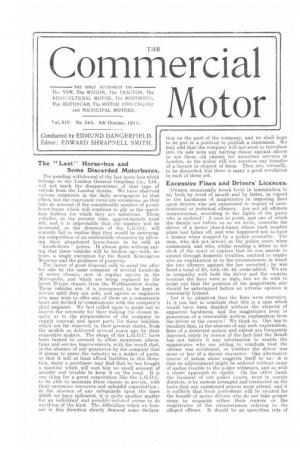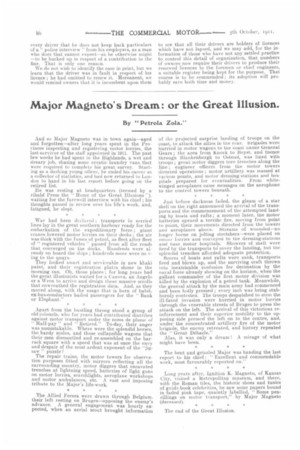The "Last " Horse-bus and Some Discarded Motorbuses.
Page 1

Page 2

If you've noticed an error in this article please click here to report it so we can fix it.
The pending withdrawal of the last horse-bus which belongs to the London General Omnibus Co., Ltd., will not mark the disappearance of that type of vehicle from the London streets. We have observed various comments in the daily newspapers to that effect, but the expressed views are erroneous, as they take no account of the considerable number of pirate horse-buses which will continue to ply in the uncertain fashion for which they are notorious. These vehicles, at the present time, approximately total 460, and it is improbable that the number will be increased, as the directors of the L.o.o.c. will scarcely fail to realize that they would be encouraging competition of an undesirable character by allowing their abandoned horse-buses to be sold at " knock-down " prices. II, almost goes without saying that these vehicles will be broken up—with, we trust, a single exception for the South Kensington Museum and the guidance of posterity. The factor of good disposal calls to mind the offer for sale by the same company of several hundreds of motor chassis, now in regular service in the Metropolis, and which are being replaced by the latest B-type chassis from the Waltharnstow works. These vehicles are, it is announced, to be kept in service until they are sold, and agents or engineers who may wish to offer any of them on a commission basis are invited to communicate with the company's chief engineer. We feel called upon to point out to buyers the necessity for their ma-king the closest inquiry as to the preparedness oF the company to supply renewal and spare parts for these vehicles, which are far removed, in their present states, from the models as delivered several years ago by their respective makers. The shops of the L.G.O.C. have been turned to account to effect numerous alterations and service improvements, with the result that, in the absence of any guarantee by the company that it means to enter the industry as a maker of parts, or that it. will at least afford facilities in this threetion, many a purchaser may find that he has bought a machine which will cost him no small amount of anxiety and trouble to keep, it on the road. It is one thing for a great corporation like the L.G.O.C. to be able to maintain these chassis in service, with their enormous resources and splendid organization ; in the absence of any safeguards upon the lines which we have indicated, it is quite another matter for an individual and possibly-Isolated owner to do anything of the kind. The difficulties which we foresee in this direction clearly demand some cleclara.
tion on the part of the company, and we shall hope to be put in a position to publish a statement. We may add that the company will not need to introduce into its sale note any barring clause against ,efforts to use these old chassis for motorbus services in London, as the police will not sanction any transfer of a licence in respect of them. They are, virtually, to be discarded, but there is many a good revolution in each of them yet.
Excessive Fines and Drivers' Licences.
Owners occasionally break forth in lamentation to us, both by word of mouth and by letter, in regard to the harshness of magistrates in imposing fines upon drivers who are summoned in respect of unintentional or technical offences. Are not all offences unintentional, according to the lights of the party who Is mulcted? A case in point, and one of which the details are before us as we wiite, concerns the driver of a motor char-h-bancs whose back number plate had fallen off, and who happened not to have a licence when stopped by a police constable. The man, who did not attend at the police court when summoned, and who, whilst sending a letter to the clerk of the court to explain that he was unable to attend through domestic troubles, omitted to tender also an explanation as to the circumstances in which the two offences against the law occurred; he was fined a total of £8, with 19s. 4d. costs added. We are in sympathy with both the driver and the owners, because the fines were so high, but we do wish to point out that the position of the magistrates also should be entertained before an adverse opinion is necessarily formed. Let it be admitted that the fines were excessive. Is it not fair to conclude that this is a case which would have been decided without the element of apparent harshness, had the magistrates been in possession of a reasonable written explanation from the driver or the owners ? We think so. One has to recollect that, in the absence of any such explanation, fines of a deterrent nature and extent are frequently imposed, solely by reason of the fact that the. Bench has not before it any information to enable the magistrates who are sitting to conclude that the offence was accidental, or whether the driver was more or less of a decent character. One alternative course of action alone suggests itself to us : it is that an adjournment might be ordered without cause of undue trouble to the police witnesses, and so with a closer approach to equity. On the other hand, the business of our police courts, even in county districts, is by custom arranged and conducted on the basis that any summoned person must attend, and it is unlikely that fresh precedents will be created for the benefit of motor drivers who do not take proper steps to acquaint either their owners or the magistrates of the circumstances relating to the alleged offence. It should be an unwritten rule of
every driver that he does not keep back particulars of a" police interview " from his employers, as a man who does that cannot expect—as he otherwise might —to be backed up in respect of a contribution to the fine. That is only one reason. We do not wish to identify the case in print, but we learn that the driver was in fault in respect of his licence ; he had omitted to renew it. Hereanent, we would remind owners that it is incumbent upon them to see that all their drivers are holders of licences which have not lapsed, and we may add, for the information of those who have not any settled practice to control this detail of organization, that numbers of owners now require their drivers to produce their renewed licenees to the foremen or chief engineers, a suitable register being kept for the purpose. That course is to be commended ; its adoption will probably save both time and money.






















